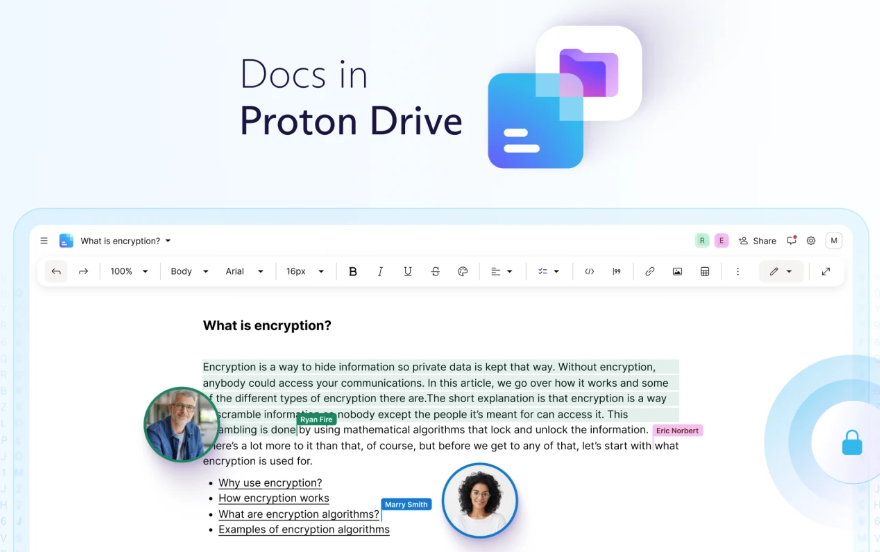Tech
Proton debuts privacy-focused alternative to Google Docs and Microsoft Word that rejects AI assistance – SiliconANGLE

Swiss privacy technology company Proton AG is looking to challenge Google LLC and Microsoft Corp. with the launch of its new word processing tool and document editor, Docs in Proton Drive.
Announced today, the new offering looks and feels like Google Docs, with many of the same document creation features used by millions of office workers each day. Users can create and edit documents, share them with others and collaborate in real-time, add comments and replies, import and export common file types such as .txt and .docx, and more.
However, where Docs in Proton Drive stands out is with its unrivaled privacy features, the company claims. Proton, which is best known for its encrypted email service, says the new offering pushes the envelope in terms of protecting users’ documents, encrypting the file itself, as well as users’ keystrokes and cursor movements, to ensure no prying eyes can see the content they’re working on.
The app is available in Proton Drive, which is an encrypted cloud data storage service launched by the company in 2022. Unlike with Google Docs, only users are given access to the end-to-end encryption keys for each document, which means that they cannot be accessed by Proton itself, the company said.
This means that, in theory, Proton Drive documents cannot be used to train generative artificial intelligence models, and they cannot be exposed in any data breach that impacts user’s computer systems. Users can share documents by adding their colleagues or friends’ email address, and they have the option to revoke their permissions at any time. However, collaborative work is possible only if others also have a Proton account.
Anant Vijay, senior product manager for Proton Mail and Proton Drive, said in a blog post that the privacy measures within Docs in Proton Drive contrast with those in Google Docs. He explained that Google “can see everything you write and keep a record of all changes that you have ever made.”
“Once you provide your data to these companies, you no longer have control over how it is used,” he added. He explained that this is a growing concern, as many people have concerns that software vendors are increasingly leaning on their customer’s data to train generative AI models. There’s also the risk that data within a user’s documents can be accessed by hackers, if the provider’s servers are exposed via vulnerabilities.
The other major advantage of Proton Docs is that the company stores all of its files on its cloud servers in Switzerland, which is subject to some of the strictest privacy laws in the world. Those laws guarantee that its data cannot be accessed by any government, including the U.S., EU and Swiss governments.
It sounds like the real deal for privacy-concerned organizations and professionals, but there do appear to be some caveats, namely formatting issues. PCMag reported that though Proton Drive itself displays a completely accurate preview of an 80-page .docx file, Proton Docs struggles to convert that document when opening it. Issues include the fonts and spacing being altered, some missing text, footers and headers disappearing, and ignored page breaks.
Other problems identified in further tests showed that strikethrough and H1 header formatting had been removed. Moreover, Proton Docs does not support Apple Pages files, and cannot open Excel files.
Still, Proton said it’s working to fix how imported documents are formatted. So users can expect updates down the line that should, if not fix these problems completely, at least make them less noticeable.
No AI integrations, ever
Although it struggles with existing files, Proton Docs should work fine for users who are creating new documents from scratch. And they may be reassured by Proton’s commitment to user privacy, at a time when other companies are caught up in all of the hype around generative AI.
Google has been busy working to integrate its Gemini generative AI models into services such as Google Drive, Docs, Sheets and Slides, so as to help users ask questions about their documents and summarize their content. But that raises some big privacy questions, as it means the Gemini models are obviously able to access everything within users’ documents.
On the other hand, Proton says it has no intention of infusing AI into its products. With Proton Drive, for example, all of the files within it are indexed on the user’s device, so users have to search manually within their own local files to find what they’re looking for. In contrast, Google wants people to start using Gemini to search for them.
Proton says this is in line with its long-held stance on providing users with absolute privacy. “You should be free to work on drafts without your data being collected, scanned and abused for profit,” it says on its website.
Proton’s flagship product is the encrypted Proton Mail service, and it also offers an encrypted calendar, drive, password manager and virtual private network for browsing.
The company said Docs in Proton Drive is rolling out now and will become available to all users globally by the end of the week. Proton Drive can be used for free but comes with limits on storage capacity. To remove those limits, users must pay for a subscription that costs up to €10 a month for individuals, and €13 per month for businesses.
Images: Proton and SiliconANGLE/Microsoft Designer
Your vote of support is important to us and it helps us keep the content FREE.
One click below supports our mission to provide free, deep, and relevant content.
Join our community on YouTube
Join the community that includes more than 15,000 #CubeAlumni experts, including Amazon.com CEO Andy Jassy, Dell Technologies founder and CEO Michael Dell, Intel CEO Pat Gelsinger, and many more luminaries and experts.
THANK YOU


)






